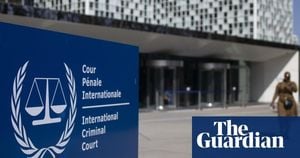Church of England Faces Pressure Over Abuse Scandal After Archbishop Quits
The resignation of Archbishop Justin Welby highlights deep-rooted issues of abuse and accountability within the Church of England.
LONDON - The Church of England is under intense scrutiny following the resignation of Archbishop Justin Welby, who announced he would step down amid growing criticism over how the Church has handled abuse allegations. His departure has prompted demands for accountability among those involved in covering up abuse cases, with many calling for stronger measures to protect vulnerable individuals within the Church.
The resignation, which came on Tuesday, marks the end of Welby’s twelve-year tenure as the Archbishop of Canterbury—a position he has held since 2013. His leadership has been characterized by efforts to unite the global Anglican community, but he now faces backlash over allegations of failing to address and investigate claims involving John Smyth, a convicted abuser who was involved with church-run camps.
On Wednesday, Archbishop of York Stephen Cottrell expressed the growing sentiment within the Church, stating, “We know some people pretty systematically covered this up, and those people do need to be brought to account.” The report, which examined the Church's responses to Smyth’s conduct, revealed severe shortcomings and raised questions about the Church’s commitment to safeguarding its members.
John Smyth, who was once respected as a barrister, is believed to have abused at least 115 children and young men during the late 1970s to the 1980s. His abuses went unchecked for years, with numerous church leaders reportedly aware of the allegations and doing little to intervene. Like many institutions, the Church has faced historical flaws concerning the handling of sexual abuse claims, which have only recently begun to be rigorously investigated.
The focus on accountability has been emphasized by Cottrell and others who advocate for change within the Church. The desire for reform was underscored by the acknowledgment of deep-seated issues within the organization, which operates on principles of faith yet struggles against the challenges posed by human failings.
Cottrell later clarified, “The church is very large and dispersed… safeguarding such an organisation is a challenge.” His words highlight the complexity and scale of addressing abuse prevention strategies within the Church. Nonetheless, he and other senior clergy remarked on the necessity for significant change moving forward to rebuild trust and protect those within its care.
The resignation of Welby is not merely about one man’s failure but rather serves as a stark reminder of the systemic shortcomings across leadership levels within the Church of England. Calls are now being made for serious investigations and potential resignations from other implicated leaders, including the Bishop of Lincoln, Stephen Conway, who faced scrutiny for his actions—or lack thereof—after being briefed on Smyth's activities back in 2013.
Providing an apology, Conway admitted he regretted not pursuing the matter more aggressively within the Church and expressed remorse for any harm caused due to insufficient action. Reports indicate he was misled about whether the allegations had been reported to the authorities.
Cottrell emphasized the need for reflection and added, “There have been great steps taken under Welby’s watch, but on this case, perhaps he relied too much on others.” The sentiment reflects the anguish within the clergy concerning thorough failings and the protective barriers the Church had relied on for too long.
While this scandal has shaken public confidence, it acts as another historical marker for the Church of England's culture of silence surrounding abuse, which many feel should never have been allowed to continue. Experts say the acknowledgment of these issues is the first step toward genuine reform and healing.
Welby had built bridges during his time with ecumenical efforts, seeking unity within the global Anglican communion, even collaborating with figures like Pope Francis. Ironically, his resignation may erode some of the goodwill he had established as advocates for reform push harder for accountability to restore faith within the Church.
Lastly, with increasing demands for transparency, the Church of England must now grapple with the shadow of its past, the impact of systemic abuses, and the road to establishing more credible safeguarding practices. The hope is not only to restructure but to facilitate environments where trust can be rebuilt, and where members can feel secure and supported.



